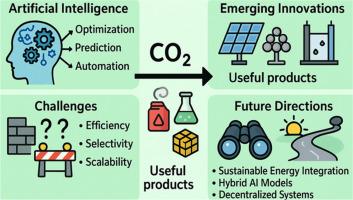Perspectives on the status and future of sustainable CO2 conversion processes and their implementation
引用次数: 0
Abstract
The rapid rise in atmospheric carbon dioxide (CO₂) concentrations continues to threaten global climate stability, underscoring the urgent need for scalable, economically viable, and sustainable CO₂ mitigation strategies. Among emerging solutions, CO₂ conversion technologies offer a transformative pathway by enabling the utilization of CO₂ as a renewable carbon feedstock for the production of fuels, chemicals, and materials, thereby promoting a circular carbon economy. The review begins by exploring foundational CO₂ capture and pre-treatment methods, emphasizing advanced materials, as well as integration strategies that directly couple capture with conversion processes as a gateway to improved CO2 conversion. Recent advancements in CO₂ conversion technologies, spanning thermochemical, electrochemical, photochemical, and biological domains are then covered. The integration of CO₂ conversion systems with renewable energy and industrial infrastructures is explored through case studies and commercialization efforts, highlighting opportunities for sector-wide decarbonization. Furthermore, the increasing role of artificial intelligence (AI) and machine learning (ML) in predictive modeling, catalyst design, and process optimization, as well as the techno-economic analyses that frame the practical deployment of these technologies is also presented. Persistent challenges including energy efficiency, long-term stability, product selectivity, and regulatory constraints are critically analyzed, and emerging solutions are proposed. The review concludes by outlining future research directions, including the development of next-generation technologies and strategies to promote interdisciplinary collaboration and public-private partnerships. By synthesizing cutting-edge advancements and identifying key barriers and opportunities, this work provides a roadmap for accelerating the global deployment of CO₂ conversion technologies toward a sustainable and decarbonized future.

对可持续二氧化碳转化过程及其实施的现状和未来的看法
大气中二氧化碳(CO 2)浓度的快速上升继续威胁着全球气候的稳定,因此迫切需要可扩展的、经济上可行的和可持续的CO 2减缓战略。在新兴的解决方案中,二氧化碳转化技术提供了一种变革性的途径,使二氧化碳成为可再生的碳原料,用于生产燃料、化学品和材料,从而促进循环碳经济。本文首先探讨了基本的二氧化碳捕获和预处理方法,强调了先进的材料,以及直接将捕获与转化过程结合起来的集成策略,作为改善二氧化碳转化的门户。在CO₂转化技术的最新进展,跨越热化学,电化学,光化学和生物领域,然后涵盖。通过案例研究和商业化努力,探讨了二氧化碳转换系统与可再生能源和工业基础设施的整合,强调了全行业脱碳的机会。此外,还介绍了人工智能(AI)和机器学习(ML)在预测建模、催化剂设计和过程优化方面日益重要的作用,以及为这些技术的实际部署提供框架的技术经济分析。对能源效率、长期稳定性、产品选择性和监管约束等持续存在的挑战进行了批判性分析,并提出了新兴的解决方案。报告最后概述了未来的研究方向,包括下一代技术的发展以及促进跨学科合作和公私伙伴关系的战略。通过综合最新进展,确定关键障碍和机会,这项工作为加速全球部署二氧化碳转换技术,走向可持续和脱碳的未来提供了路线图。
本文章由计算机程序翻译,如有差异,请以英文原文为准。
求助全文
约1分钟内获得全文
求助全文

 求助内容:
求助内容: 应助结果提醒方式:
应助结果提醒方式:


